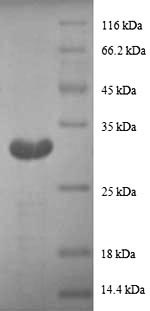Recombinant Human Metallothionein-1G (MT1G) , partial
CAT:
399-CSB-EP015113HU1(F2)-02
Size:
100 µg
Price:
Ask
- Availability: 24/48H Stock Items & 2 to 6 Weeks non Stock Items.
- Dry Ice Shipment: No




Recombinant Human Metallothionein-1G (MT1G) , partial
- CAS Number: 9000-83-3
- Gene Name: MT1G
- UniProt: P13640
- Expression Region: 1-59aa
- Organism: Homo sapiens
- Target Sequence: MDPNCSCAAGVSCTCASSCKCKECKCTSCKKSCCSCCPVGCAKCAQGCICKGASEKCSC
- Tag: N-terminal GST-tagged
- Source: E.coli
- Field of Research: Cancer
- Assay Type: In Stock Protein
- Relevance: Metallothioneins have a high content of cysteine residues that bind various heavy metals; these proteins are transcriptionally regulated by both heavy metals and glucocorticoids.
- Purity: Greater than 90% as determined by SDS-PAGE.
- Activity: Not Test
- Length: Partial of Isoform 2
- Form: Liquid or Lyophilized powder
- Buffer: If the delivery form is liquid, the default storage buffer is Tris/PBS-based buffer, 5%-50% glycerol. If the delivery form is lyophilized powder, the buffer before lyophilization is Tris/PBS-based buffer, 6% Trehalose, pH 8.0.
- Reconstitution: We recommend that this vial be briefly centrifuged prior to opening to bring the contents to the bottom. Please reconstitute protein in deionized sterile water to a concentration of 0.1-1.0 mg/mL.We recommend to add 5-50% of glycerol (final concentration) and aliquot for long-term storage at -20℃/-80℃. Our default final concentration of glycerol is 50%. Customers could use it as reference.
- Function: Metallothioneins have a high content of cysteine residues that bind various heavy metals; these proteins are transcriptionally regulated by both heavy metals and glucocorticoids.
- Molecular Weight: 32.9 kDa
- References & Citations: Induction by zinc of specific metallothionein isoforms in human monocytes.Pauwels M., van Weyenbergh J., Soumillion A., Proost P., Ley M.Eur. J. Biochem. 220:105-110 (1994)
- Storage Conditions: The shelf life is related to many factors, storage state, buffer ingredients, storage temperature and the stability of the protein itself. Generally, the shelf life of liquid form is 6 months at -20℃/-80℃. The shelf life of lyophilized form is 12 months at -20℃/-80℃.
